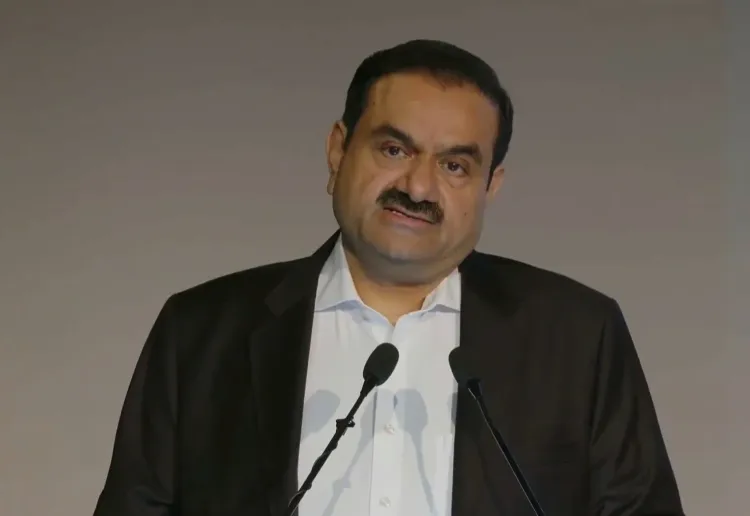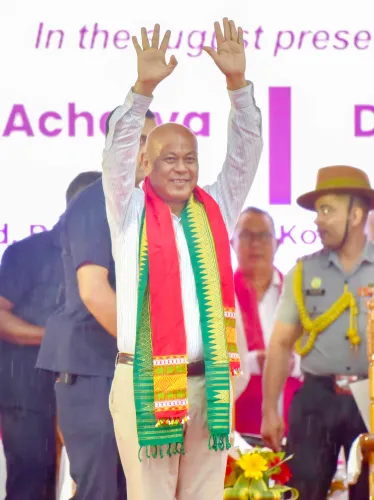Did International Media Paint Us as Villains Over the Coal Project in Australia?

Synopsis
Key Takeaways
- Resilience is crucial in the face of global criticism.
- Leadership often invites resistance and requires conviction.
- The Carmichael project represents a strategic shift towards energy security for India.
- Extraordinary results demand extraordinary commitment and perseverance.
- True greatness comes from mastering struggles.
Lucknow, Aug 7 (NationPress) In a revealing public discourse, Adani Group Chairman Gautam Adani elaborated on the intense global backlash and organized opposition his company encountered regarding the Carmichael coal project in Australia. Speaking to faculty and students at the Indian Institute of Management in Lucknow, he portrayed the decade-long struggle to bring the contentious project to fruition as a crucial test of resilience that reshaped both his company and his personal journey.
"In Australia, the international media made us villains," Gautam Adani remarked, taking a moment to reflect before continuing: "Banks withdrew support. Insurance firms turned us down. Activists obstructed our paths. Legal actions were initiated against us. We faced accusations in courts, discussions in legislative bodies, and scrutiny in news headlines. Our on-ground team faced harassment. Our right to operate on that land was challenged. Each step forward was met with a clear message: retreat."
Yet, he stood firm.
Gautam Adani’s recounting of the Carmichael mine narrative was not an effort to downplay the project’s environmental implications — a topic that remains contentious. Rather, he framed it as a moral and strategic decision. Not merely a tribute to coal, as detractors claimed, but a symbol of energy security. Not a mere commercial venture, but a crucial national necessity. "It wasn’t driven by a desire for coal," he stated. "It emerged from the need to provide India with high-quality coal. It was a step toward reducing carbon emissions and achieving India’s energy independence."
The political sensitivity surrounding the project stemmed from its location and timing. An Indian company was attempting to enter one of the most rigorously regulated democracies globally, proposing to launch one of its largest energy initiatives amid organized, cross-border environmental opposition. "We lacked political leverage in Australia. No historical ties. No institutional backing. Yet, we maintained our position," he explained.
Gautam Adani’s comments come at a time when India’s energy strategy is under heightened global observation — balancing the push for a quicker transition to renewables against the persistent reality of its coal-dependent energy framework. His reflections on the Australian episode illustrated a broader theme in his speech: bold leadership often provokes resistance, and conviction amidst discomfort is vital for achieving lasting impact.
The Carmichael project, which initially seemed an audacious gamble, has grown into a vital Indo-Australian corridor — both economically and strategically. The Adani Group leader noted that the project now supplies industries with cleaner coal, supports numerous jobs in Australia, and exemplifies the company’s steadfastness against external pressures. He characterized it as a narrative of endurance rather than merely fossil fuels.
His address, delivered with clarity and emotional depth, deviated from conventional business school presentations. Absent were slides, charts, and evasions. Instead, Gautam Adani shared an unscripted personal philosophy grounded in risk, faith, and defiance. He emphasized to the students that mere business frameworks cannot shape the future. It is those willing to create paths where none exist — even in the face of opposition — who shape the future.
This defiance was contextualized within larger, challenging questions — about leadership in a world where the line between global governance and ideological activism is increasingly indistinct – about the right of emerging economies to pursue development on their own terms – and about the significant personal sacrifices that often come with long-term vision.
Throughout his address, Gautam Adani reiterated that extraordinary results demand extraordinary commitment and perseverance. "The easy path seldom leads to memorable lives," he advised the students. "It is the daring route — fraught with risks and resistance - that forges leaders who leave a mark on history."
His narrative regarding Australia served as a cautionary lesson — a reminder that disruption is seldom celebrated at the moment. Often, it is only in hindsight that these choices are recognized as acts of imagination, bravery, and nation-building.
As he concluded, the Adani Group Chairman refrained from depicting the past as flawless or the future as certain. Instead, he encouraged the students to face discomfort, embrace challenges, and understand that true greatness comes not from a lack of struggle, but from mastering it.
"Let your journey be the proof," he stated, "that dreams rooted in Indian soil can remain steadfast, even when faced with external pressures."









